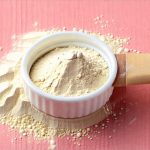Protein powders have become incredibly popular in recent years, fueled by increasing interest in fitness, nutrition, and overall well-being. From bodybuilders looking to maximize muscle growth to individuals simply seeking an easy way to supplement their diet, these powders offer a convenient source of protein. However, with widespread use comes increased reports – and concerns – about digestive discomfort. Many people experience bloating, gas, diarrhea, or stomach cramps after consuming protein powder, leading them to question whether this seemingly beneficial supplement is actually causing harm to their gut. Understanding why this happens requires delving into the ingredients within these powders, how our bodies digest them, and individual sensitivities that can play a significant role.
The sheer variety of protein powders available – whey, casein, soy, pea, rice, hemp, and blends thereof – further complicates matters. Each type has its own unique composition and potential to cause digestive issues, depending on the person consuming it. It’s not necessarily protein itself that’s the problem; rather, the associated components within the powder, or how they interact with individual physiology, are often the culprits. Furthermore, factors like dosage, timing of consumption, and pre-existing gut health conditions can all contribute to whether someone experiences digestive distress. This article will explore the common reasons why protein powders might cause stomach problems, offering insights into identification, mitigation strategies, and when it’s best to seek professional guidance.
Common Culprits Behind Protein Powder Stomach Problems
Protein powders aren’t just pure protein; they contain a multitude of ingredients added for taste, texture, mixability, and shelf life. These additives are frequently the source of digestive upset. Lactose, found in whey concentrate (a common type of protein powder), is a major offender for those with lactose intolerance, triggering symptoms like bloating, gas, and diarrhea. Artificial sweeteners – sucralose, aspartame, saccharin – can also cause issues as some individuals struggle to digest them efficiently, leading to fermentation in the gut and subsequent discomfort. Can artificial flavors cause digestive issues. Similarly, sugar alcohols (sorbitol, mannitol, xylitol) often added for sweetness have a laxative effect, even in small amounts.
Beyond sweeteners, thickeners like guar gum or xanthan gum are used to improve texture but can cause bloating and gas, particularly in individuals sensitive to FODMAPs (fermentable oligosaccharides, disaccharides, monosaccharides, and polyols). These compounds draw water into the gut, potentially leading to diarrhea. Finally, even seemingly benign ingredients like soy lecithin – added as an emulsifier – can be problematic for some, causing allergic reactions or digestive issues. The key is recognizing that it’s rarely just the protein itself; instead, a combination of factors within the powder and individual sensitivities combine to create discomfort.
Whey protein isolate and hydrolysate are often recommended alternatives to whey concentrate for those with lactose sensitivity, as they undergo further processing to remove most of the lactose. However, even these options aren’t foolproof, and some individuals may still experience issues depending on their level of intolerance. Plant-based proteins can be a good alternative, but even they have potential drawbacks; soy protein might cause gas in some, while pea protein contains compounds that can also contribute to bloating. Understanding your individual tolerances is crucial for choosing the right protein powder.
Identifying Your Protein Powder Trigger
Pinpointing the exact ingredient causing stomach problems can be challenging, requiring a process of elimination and careful observation. The first step is to carefully review the label of your protein powder, paying attention to all ingredients – not just the protein source itself. Look for potential triggers like lactose, artificial sweeteners, sugar alcohols, or thickeners.
- Keep a food diary: Track what you eat (including protein powder) and any associated symptoms. Note the time of consumption, dosage, and severity of discomfort.
- Switch to a different type of protein powder: If you suspect whey concentrate is causing issues, try switching to isolate, hydrolysate, or a plant-based alternative.
- Elimination diet: Consider temporarily eliminating protein powder altogether to see if your symptoms resolve. Then, slowly reintroduce it while monitoring for any recurrence of discomfort.
If you’ve identified a potential trigger but are still unsure, consider trying single-ingredient powders – those with minimal additives – to isolate the problem. For example, try a pure whey protein isolate without any sweeteners or thickeners. If symptoms persist even with a simplified formula, the issue might not be related to the powder itself but rather an underlying digestive condition. It’s important to remember that everyone’s gut is different, and what works for one person may not work for another. Can food sensitivities cause inflammation can further complicate things.
Dosage & Timing Considerations
The amount of protein consumed in a single sitting can significantly impact digestion. Consuming excessively large doses – exceeding your body’s capacity to absorb it efficiently – often leads to bloating, gas, and diarrhea. The general recommendation is to spread protein intake throughout the day rather than consuming a massive dose at once. A good starting point is 20-30 grams of protein per serving, adjusting based on individual needs and tolerance.
Timing also plays a crucial role. Consuming protein powder on an empty stomach can accelerate digestion for some but exacerbate symptoms in others, especially those sensitive to lactose or sugar alcohols. Experimenting with different timing – before, after, or with meals – can help determine what works best for your body. Combining protein powder with easily digestible carbohydrates (like fruit) might also improve tolerance by slowing down absorption and preventing a rapid spike in blood sugar levels. Why even healthy diets can cause discomfort is something to consider as well when timing your protein intake.
Pre-Existing Gut Health & Underlying Conditions
Individuals with pre-existing digestive conditions – such as Irritable Bowel Syndrome (IBS), Small Intestinal Bacterial Overgrowth (SIBO), or Inflammatory Bowel Disease (IBD) – are more likely to experience stomach problems from protein powder. These conditions can impair the gut’s ability to properly digest and absorb nutrients, making them particularly vulnerable to sensitivities.
- IBS: Protein powders containing FODMAPs can worsen symptoms of bloating, gas, and abdominal pain in individuals with IBS.
- SIBO: Undigested carbohydrates from protein powder (like sugar alcohols) can feed bacteria in the small intestine, leading to increased gas production and bloating.
- IBD: Inflammation associated with IBD can further compromise digestive function, making it harder to tolerate certain ingredients in protein powders.
If you have a diagnosed gut condition, consulting with a gastroenterologist or registered dietitian is essential before incorporating protein powder into your diet. They can help you choose a suitable product and develop a personalized strategy to minimize digestive distress. It’s crucial not to self-diagnose or attempt to manage these conditions without professional guidance. Can gut sensitivities cause panic attacks is also something to be aware of when dealing with gut health.
It’s also important to remember that food sensitivities and allergies can often mimic digestive issues, so ruling those out with appropriate testing is worthwhile if symptoms are persistent and unexplained. Can protein powders trigger intolerance should be considered when looking at the root cause of your discomfort. Also, consider exploring what an abdominal x-ray can reveal about digestive problems. Finally, don’t forget to check if food intolerances cause eye puffiness as this can be a sign of underlying sensitivities.


















